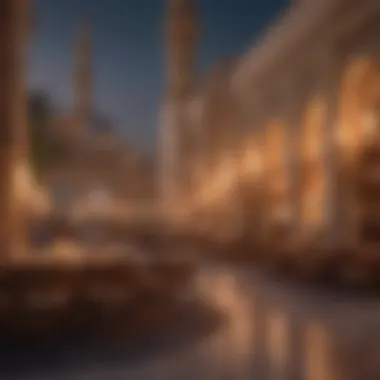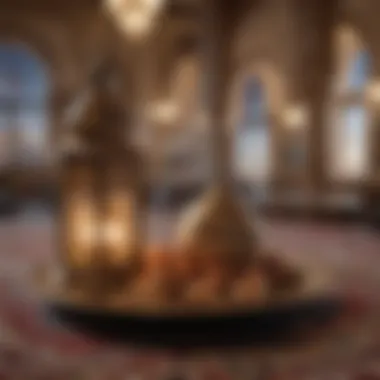Ramadan 2023 Timing in the UAE: Complete Guide


Intro
Ramadan holds a special place in the hearts of millions, serving as a time of reflection, devotion, and community. As the sacred month approaches, residents and visitors in the United Arab Emirates find themselves immersed in its profound significance. In 2023, this period is expected to begin around March 23 and continue until April 21, although the exact dates depend on the sighting of the moon.
For many in the UAE, Ramadan isn't just about fasting; it's a mosaic of traditions and activities that bring people together. The atmosphere buzzes with anticipation as families prepare for iftar—the meal to break the fast—often featuring communal gatherings laden with sumptuous dishes. In contrast, the mornings are marked by the pre-dawn meal known as suhoor. This article offers a detailed overview of Ramadan 2023 in the UAE, examining how the timing of fasting and cultural practices adapt to local customs.
Understanding the nuances of this month aids both locals and travelers in navigating the unique cultural terrain of the UAE.
By delving into the timings of fasting across various emirates, as well as exploring the prevailing traditions, this guide aspires to equip readers with the knowledge needed to engage with this important period sympathetically and appropriately.
Preamble to Ramadan in the UAE
Ramadan holds a monumental place in the heart of the Islamic world, encapsulating faith, spirituality, and introspection. Within the context of the United Arab Emirates, this period transforms not only individual lives but also communities, economies, and cultural dynamics. The importance of Ramadan lies not just in the practice of fasting but also in the sense of unity it fosters among people. Understanding Ramadan in the UAE presents an intricate tapestry woven with deep-rooted traditions, societal norms, and unique adaptations to local culture.
The UAE’s vibrant population reflects a rich mix of cultures, which makes the observance of Ramadan particularly significant. By examining how Ramadan is not just a time of fasting, but a month filled with charity, community gatherings, and special events, one can appreciate the profound impact it has on daily life.
When shining a spotlight on this month, we uncover the benefits it entails: self-discipline, spiritual growth, and enhanced gratitude for one’s blessings. Moreover, Ramadan serves as an opportunity to educate the diverse population about Islamic customs, ensuring that both Muslims and non-Muslims can navigate this sacred time with respect and understanding.
In short, the introduction to Ramadan in the UAE offers a foundational understanding of its significance, which resonates throughout the following sections, deepening the reader's insight into this transformative period.
What is Ramadan?
Ramadan is the ninth month of the Islamic lunar calendar and is recognized as a month of fasting for Muslims worldwide. It is during this time that participants refrain from eating and drinking from dawn until sunset. But Ramadan is not simply about abstaining from food and drink; it embodies a time for spiritual reflection, increased devotion, and worship.
Historical Context of Ramadan Observance
The observance of Ramadan dates back to the time of the Prophet Muhammad, who received the first revelations of the Quran during this month. Its historical roots are deeply tied to Islamic teachings which emphasize self-restraint, empathy for the less fortunate, and the importance of community.
In the UAE, where modernity meets tradition, Ramadan observance has adapted over the years, incorporating local customs while remaining faithful to its core principles. The juxtaposition of traditional practices with contemporary lifestyles showcases the UAE's commitment to preserving its cultural heritage. This historical context provides essential insights into how various practices during Ramadan have evolved and adapted, making this month not only significant in a spiritual sense but also in its social, economic, and cultural dimensions.
Ramadan in 2023: Key Dates
Understanding the key dates for Ramadan in 2023 is essential for individuals and businesses alike in the United Arab Emirates. Given the significance of this holy month, the timing not only influences traditions and observances but also impacts various sectors, from commerce to real estate. Knowing when Ramadan begins and ends helps in planning gatherings, activities, and even financial decisions.
Commencement of Ramadan
The start of Ramadan is a moment of great reverence. In 2023, Ramadan is expected to commence on the evening of March 22, following the sighting of the moon, although this date can shift based on lunar sightings. Muslims in the UAE will prepare for this month by adjusting their daily schedules, focusing on spiritual growth, and embracing the communal aspects of the observance.
While many people reflect inwardly and prioritize devotion, businesses often extend hours, adapting to the fasting schedule.
Here are several considerations regarding the commencement of Ramadan:
- Fasting Begins: The fast, which involves abstaining from all food and drink from dawn to sunset, starts the following morning, March 23.
- Community Observances: Mosques will hold special prayers and gatherings, enhancing community spirits.
- Family Preparations: Homes are often adorned and stocked with food for the evening meals, known as Iftar.
Individuals might also consider setting up their living spaces to facilitate prayers, creating a peaceful atmosphere conducive for reflection.
Eid al-Fitr: Ending of Ramadan
Eid al-Fitr marks the end of Ramadan and is celebrated with festivities, reflecting joy and gratitude. Expected to be observed on April 21, depending on the sighting of the moon, this occasion brings families together to share meals and exchange gifts.


Several aspects of Eid al-Fitr deserve attention:
- Significance of Zakat al-Fitr: This is a charitable contribution made before the Eid prayer, typically aimed at benefiting the less fortunate.
- Cultural Celebrations: The day features communal prayers, feasting, and festivities, making it not only a religious occasion but a cultural cornerstone in the UAE.
- Tourism Boost: Many visitors flock to the UAE during this time, affirming the country’s position as a melting pot of cultures.
In essence, knowing these key dates in Ramadan is not just about spiritual preparation; it's also about understanding the wider societal implications and how these timings resonate with both locals and expatriates, helping shape plans for personal, social, and business activities during this month.
Fasting Hours in the UAE
Fasting during Ramadan is not just an act of abstaining from food and drink; it's an essential pillar of the faith for Muslims and embodies spiritual reflection, self-discipline, and empathy for the less fortunate. In the UAE, where a diverse population coexists, understanding the fasting hours holds particular significance. This section will delve into the timing for Suhoor and Iftar, and how variations occur across the emirates, like Dubai, Abu Dhabi, and Sharjah.
Timing for Suhoor and Iftar
Every day during Ramadan starts with the pre-dawn meal called Suhoor, which Muslims consume to prepare for a day of fasting. This meal typically happens just before Fajr, the first prayer of the day. The exact timing of Suhoor can change day by day, often reflecting the movements of the sun and the specific location.
Iftar, the evening meal that breaks the fast, occurs at sunset. This moment is marked by the call to Maghrib prayer, and it's a time of celebration, often with family and friends. Usually, dates and water are consumed first, following the Sunnah of the Prophet Muhammad, before indulging in a bigger meal. The guidelines for both Suhoor and Iftar timings in the UAE are readily available through local Islamic authorities or apps designed to provide prayer times, helping the community keep track of these important moments throughout the month.
Variations Across Different Emirates
Dubai
Dubai stands as a vibrant hub where traditions blend seamlessly with modernity. Here, fasting hours are quite straightforward, starting around 4:30 AM for Suhoor and concluding at approximately 6:45 PM for Iftar. One of the standout features of Dubai is its extensive availability of Ramadan tents and pop-up eateries that serve Iftar meals, enhancing the communal experience. Hence, for residents and visitors, this city is a focal point for community spirit and traditions centered around Ramadan.
In addition, Dubai’s assortment of cultural activities and community events during this month offers a unique opportunity to engage with local customs. From Iftar buffets at luxury hotels to community dinners in neighborhoods, Dubai's culinary offerings exemplify both comfort and luxury.
Abu Dhabi
Abu Dhabi, the capital, provides a different yet equally engaging Ramadan experience. The Suhoor timing might be quite similar, usually starting around 4:30 AM, but Iftar varies by about fifteen minutes, often around 6:30 PM.
What makes Abu Dhabi stand out is its emphasis on cultural programs during Ramadan, including art displays and educational workshops focusing on Islamic traditions. These events give residents and visitors an opportunity to learn about Islamic art and connect with the local heritage.
The government also actively encourages iftar gatherings in mosques and public places, ensuring everyone feels included. The emphasis on community gatherings makes Abu Dhabi a more inclusive choice for those who are keen on experiencing Ramadan’s spirit in a profound way.
Sharjah
In Sharjah, the approach to fasting hours aligns closely with its neighbors, with Suhoor beginning around 4:30 AM and Iftar recognized around 6:40 PM. Known for being a more traditional emirate, Sharjah's Ramadan customs often reflect deeper cultural practices.
The city prides itself on hosting numerous community gatherings, including open-air Iftar venues. Many of these events are family-oriented, fostering a sense of togetherness and belonging. With its family-friendly environment, Sharjah can be a great choice for enjoying Ramadan in a manner that emphasizes the communal aspects of dining and sharing thoughtful moments with others.
"Ramadan is a time for reflection, community, and a chance to connect with one's spiritual roots, seen vividly across the emirates in the UAE."
In summary, the fasting hours across the UAE represent more than just a schedule; they mark a period of vibrant community interactions, cultural customs, and deep personal reflections during the holy month.
Cultural Practices During Ramadan
Ramadan is not merely a period of fasting; it holds deep cultural significance in the UAE. For many, it’s a time to renew faith, strengthen community bonds, and embrace charity. The cultural practices during this sacred month create an intricate tapestry of traditions that reflect the identity of the nation. These customs foster a sense of belonging and unity, linking cultural heritage with modern practices. It is crucial for both residents and visitors alike to understand and appreciate these practices, as they encapsulate the spirit of Ramadan.
Common Traditions and Rituals


The traditions observed during Ramadan in the UAE showcase a blend of ancient customs and contemporary values. For instance, the pre-dawn meal known as Suhoor is a vital ritual. Families commonly gather to share this last meal before the fast begins. This act often helps strengthen family ties and encourages unity.
After sunset, the Iftar is another highlight. The moment the sun dips below the horizon is met with the sound of cannon fire in many cities, signaling it’s time to break the fast. Dates and water are traditionally consumed first, as per Islamic teachings. Then, families and friends come together to enjoy a variety of dishes, celebrating the end of the day’s fast with an abundance of food.
Moreover, spiritual practices such as Tarawih prayers, which occur at night, add a deeper dimension. During this time, many people attend mosques to engage in lengthy prayers and listen to the recitation of the Quran, creating an atmosphere of reverence and devotion.
In addition to these, charitable activities are significant. The culture of giving back, or Zakat, is woven into the fabric of Ramadan. People are encouraged not just to donate but to participate actively in community service, aiming to assist the less fortunate in their areas. This reinforces social bonds and cultivates empathy.
Community and Social Gatherings
Ramadan is a prime time for community interaction, turning the month into a festival of togetherness. Various community iftars are organized in neighborhoods, where people from different backgrounds come together to share meals. Such events provide an opportunity for building bridges and enhancing cultural exchanges among residents, including non-Muslims. They foster an understanding of one another’s traditions, highlighting the UAE’s melting pot of cultures.
City squares and public spaces see a surge in gatherings for spiritual reflections, storytelling, and cultural demonstrations. Such settings become vibrant hubs of activity — families stroll through markets, or souks, specifically set up for Ramadan, offering traditional foods, sweets, and gifts.
Not to be overlooked are the special events hosted in malls, where entertainment mingles with tradition. From live performances to themed exhibitions, these activities cater not just to the Muslim population but include everyone in the celebrations. They exemplify how Ramadan encourages inclusivity, demonstrating respect among various communities as they partake in the festivities.
Ramadan and Dubai Real Estate
The intersection of Ramadan and the Dubai real estate market is both intriguing and multifaceted. This unique month, characterized by reflection and fasting, also influences the dynamics of property investment and market behavior in the city. With many residents focusing on spiritual practices, the patterns in the housing and rental markets tend to shift, creating noteworthy ramifications for investors and real estate professionals.
Impact on Property Markets
During Ramadan, the overall mood of the market can change. Traditionally, property showings and transactions may slow down, as people are often preoccupied with their observance and social gatherings. However, this does not mean all activity halts. In fact, certain neighborhoods may see an uptick in interest as families gather for Iftar, creating a sense of community that attracts potential buyers or renters.
Factors influencing this include:
- Increased demand for family-oriented properties: As gatherings become more common, larger homes or those with amenities for family interaction tend to attract more interest.
- Marketing strategies adapted for Ramadan: Real estate professionals often tailor their marketing efforts to align with the sentiments of the month, promoting properties through community-focused events.
- Price adjustments: In some areas, landlords might adjust rental prices or offer incentives during Ramadan to fill vacancies, aiming to capitalize on the market's unique timing.
As such, understanding these nuances can empower investors to make well-informed decisions that consider both market conditions and cultural contexts.
Investment Opportunities During Ramadan
Despite the challenges, Ramadan also brings with it unique investment opportunities within the Dubai real estate sector. Investors who remain attuned to the market can find valuable prospects, particularly in the catering to the needs of the fasting community.
Here are some noteworthy avenues:
- Residential properties near mosques: As communal prayers gain importance, properties located close to mosques can see increased interest.
- Commercial properties catering to Ramadan needs: Businesses that focus on the supply of Iftar gatherings, such as catering services and grocery outlets, thrive during this time.
- Vacancy rate analysis: The slow market can provide a chance for strategic purchases at lower prices, particularly when compared to typical market trends outside of Ramadan.
"Investors who seize opportunities during Ramadan might find themselves in a strategic position prepared for post-Ramadan growth."
Ultimately, Ramadan not only shapes social dynamics but also offers a lens through which to view the potential fluctuations and opportunities within the Dubai real estate landscape. Staying informed about these trends can guide investors and developers toward making wise choices and preserving their investment value in a rapidly changing environment.
Health Considerations During Ramadan
Understanding the health aspects of Ramadan can greatly enhance one’s experience during this holy month. Fasting, when done correctly, can provide numerous benefits, including mental clarity, spiritual growth, and physical rejuvenation. However, there are also critical elements to consider to ensure that health is not compromised amidst fasting practices.
Nutrition and Diet During Fasting


Fasting from dawn until dusk poses its own set of nutritional challenges. It’s pivotal to focus on a balanced diet to sustain energy levels throughout the day. Typically, meals are split into Suhoor, the pre-dawn meal, and Iftar, the meal that breaks the fast at sunset.
- Suhoor Choices: Opt for foods that release energy slowly over time. Whole grains like oats, legumes such as lentils, and proteins found in eggs and dairy can be beneficial. Incorporating fruits like bananas can give a quick energy boost. Water intake should not be overlooked; staying hydrated during Suhoor is crucial.
- Iftar Rituals: Traditionally, the fast is broken with dates and water, a practice rooted in various hadiths. Following this, meals should incorporate a variety of nutrients. Including fresh salads, lean meats, and plenty of vegetables can help in restoring lost nutrients. Avoiding overly rich or fried dishes can help minimize feelings of sluggishness.
"The right nutrition choices can be a game changer, keeping you agile and sharp throughout Ramadan."
Exercise and Wellbeing
Keeping active during Ramadan can be a double-edged sword. While physical activity is important for maintaining health, energy levels may vary significantly from day to day.
- Timing Matters: Ideally, exercising should coincide with when you can hydrate, either shortly after Iftar or before Suhoor. This timing aids in hydration and energy replenishment. Light activities like walking or gentle stretching can be effective during fasting hours. Those who are more conditioned can consider moderate workout routines, but it’s wise to listen to one’s body.
- Mental Wellbeing: Ramadan isn't only a physical journey; it's also a spiritual one. Taking time for relaxation, practicing mindfulness, or engaging in community activities can enhance your emotional health. Balancing fasting with these practices can significantly boost both mental clarity and spiritual fulfillment.
In essence, successfully navigating the health requirements during Ramadan hinges on understanding the nuanced approach to diet and exercise, making informed choices, and listening to one’s body. These considerations are not only beneficial during Ramadan but also pave the way for a healthier lifestyle beyond the holy month.
Tips for Non-Muslims During Ramadan
Navigating Ramadan as a non-Muslim in the UAE can be a unique and enriching experience. Being mindful of local customs and practices not only shows respect but can also open the door to deeper cultural understanding. The importance of these tips is highlighted by the vibrant interactions happening throughout this sacred month. Familiarizing oneself with what to expect during Ramadan can help ensure a harmonious coexistence and foster respect among different cultures.
Respecting Fasting Practices
Ramadan is primarily characterized by fasting from dawn until dusk. For Muslims, this month is not just about abstaining from food and drink; it is also a time of spiritual reflection and heightened devotion. As a non-Muslim, it is essential to be aware of the fasting practices in place:
- Avoid eating and drinking in public: While it might feel inconvenient, fasting individuals appreciate when non-Muslims refrain from eating or drinking in public view during fasting hours. This consideration goes a long way in fostering goodwill.
- Be conscious of music and entertainment: Some areas, especially public spaces, might minimize entertainment like loud music and performances. It's seen as a way to maintain a serene atmosphere during this holy month.
- Understand the mood: Many people are in a more reflective state during Ramadan. Adapting your behavior to align with the thoughtful ambiance can show respect.
A little awareness can go a long way. Remember, it's about promoting mutual respect.
Participating in Cultural Events
Ramadan is not only a time for fasting; it is filled with cultural richness and social activities. Non-Muslims are encouraged to take part in various events that celebrate the spirit of the month:
- Attend Iftar gatherings: Many Muslims open their fast with a meal called Iftar. This is often done communally; many families welcome non-Muslim friends into their homes or to public Iftar events. It’s a wonderful opportunity to experience Ramadan's significance firsthand.
- Visit Ramadan-themed markets and festivals: The UAE hosts numerous cultural events during Ramadan, such as night markets and community spaces decorated with lights. These gatherings often feature food stalls, artistic displays, and activities that highlight Islamic traditions.
- Engage in charitable activities: Ramadan emphasizes giving and compassion. Non-Muslims can participate in charitable events or volunteer opportunities that focus on helping the less fortunate. Joining hands in such activities promotes understanding between cultures.
To sum up, spending Ramadan in the UAE as a non-Muslim involves a balance of respect and participation. Understanding and adapting to fasting practices is foundational, but embracing cultural events enriches the experience, creating bonds that transcend religious boundaries.
Ending: Ramadan's Modern Significance
The significance of Ramadan stretches beyond mere fasting; it encapsulates a myriad of cultural, social, and spiritual elements that shape the identity of millions in the UAE today. As the holy month unfolds, Muslims engage in a deeper reflection of their faith, manifesting through collective prayers, charitable acts, and community bonds. In a rapidly evolving society, Ramadan serves as a powerful reminder of patience, resilience, and a unified purpose among the diverse population of the UAE.
The Evolving Narrative of Ramadan in the UAE
This modern interpretation of Ramadan in the UAE is quite intriguing. Many see it as a blend of tradition and contemporary influence. With an influx of different cultures, the month has adapted in some unique ways. Restaurants that traditionally close during daylight hours now offer special iftar menus, showcasing local dishes alongside international cuisines. This not only reflects the growing multicultural aspect of the UAE but also highlights how Ramadan continues to be an influential period that welcomes everyone, regardless of their faith.
Furthermore, the digital age redefines how Ramadan is observed. Social media campaigns and online community events have surged, making it easier for people to connect with loved ones, share experiences, and engage in charitable giving. Videos showcasing preparation for iftar meals or community service initiatives flood platforms like Facebook and Reddit.
"Ramadan is a season of reflection, exponential growth, and community cohesion—where ancient traditions meet the pulse of modern life."
For those not observing the fast, a growing awareness about respecting fasting practices is crucial. Understanding that this is a time for self-discipline and spiritual growth creates a framework of respect across all demographics. The overall atmosphere enhances community spirit, creating an inclusive environment where understanding and mutual respect reign supreme.
Key Points to Remember
- Ramadan fosters cultural exchange and celebrates communal ties.
- Iftar meals highlight culinary diversity, bringing people together.
- Digital platforms facilitate shared experiences and charitable gestures.
- Respect for fasting practices fosters community inclusivity.
In summary, Ramadan's modern significance is woven into the fabric of the UAE's social landscape, making it as much a cultural event as a spiritual one. It contributes to a unified narrative that nurtures growth, connection, and respect among all citizens and residents.



